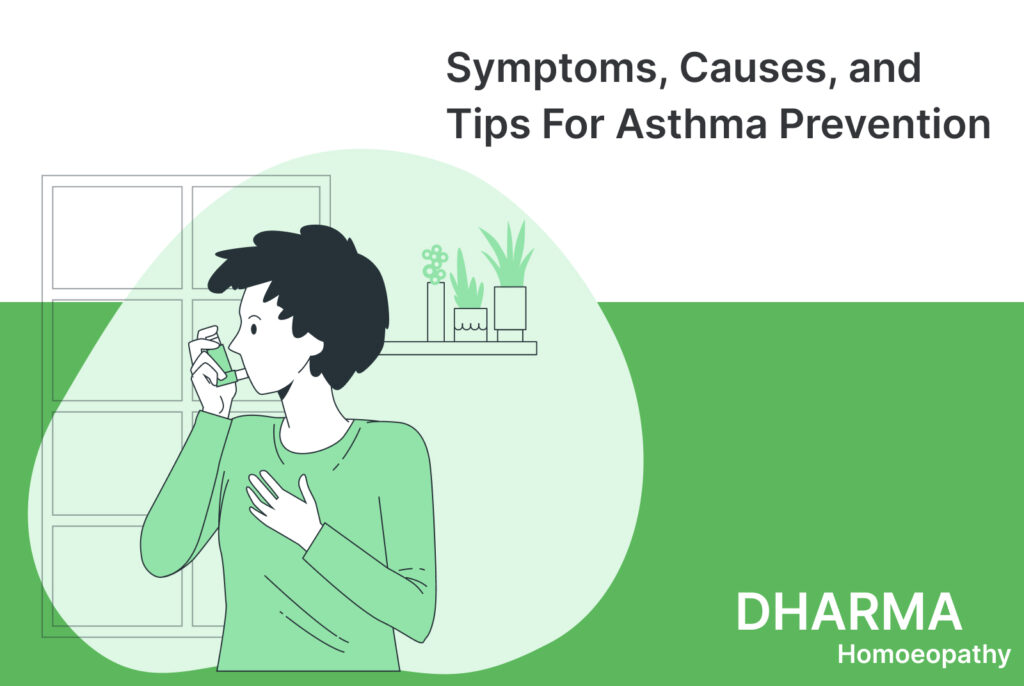A respiratory condition known as asthma is characterized by breathing difficulties, wheezing, coughing, and difficulty breathing. It is brought on by the airways’ constriction and swelling, which might result in more mucus being produced. Although asthma can strike at any age, it usually strikes children and adolescents. Allergies are triggered by the environment, and a genetic predisposition is the main cause of asthma. Inhaling airborne allergens such as dust mites, pollen, pet dander, or cockroach excrement particles, can cause asthma episodes.
Asthma may be a minor issue for some patients, but for a small number of people, it may be a serious issue that interferes with their everyday lives and can result in life-threatening asthma episodes.
Around the world, asthma is a highly common ailment that affects many people. Any age group, from a month-old infant to the elderly, may be affected.
With the right management, asthma can be managed, allowing one to lead a healthy and active life.
Types of Asthma:
- Asthma in Children: Children with asthma are referred to as childhood asthma. Children may differ in their susceptibility to developing asthma, as well as in the frequency, length, and severity of their asthmatic attacks. Mild childhood asthma may disappear if it is successfully treated at this age.However, there is still a chance that asthma will flare up later in life. Children from the age of one to fourteen are more likely to develop asthma because of exposure to various allergens, environmental pollution, chemical exposure, hereditary factors, dietary choices, and the abuse of antibiotics.
- Workplace Asthma: Asthma that has been brought on by an individual’s job is known as Workplace asthma. The symptoms of occupational asthma worsen while a person is working in a specific environment, such as a bakery, the chemicals industry, a farm, a laboratory, a medication factory, a plastic or metal plant, a wood manufacturing facility, a painting job, etc.On days when the individual is not on the job or in other environments that cause an asthma attack, symptom alleviation may be more effective. Along with signs of asthma, some patients may also have symptoms including running nose, congestion and eye discomfort, cough, etc.
- Seasonal Asthma: A form of asthma known as seasonal asthma only affects some patients during specific seasons of the year. This kind of asthma is characterised by symptoms that are brought on by seasonal triggers, such as pollen, cold temperatures, foggy or wet weather, etc.
- Workout Asthma:A strenuous workout can start an asthma episode in a lot of asthma patients. Within a few moments after a workout, patients may experience tightness in their chest, shortness of breath, or coughing.
Root Causes of Asthma
Asthma has a variety of complicated root causes that may include a combination of environmental, genetic, and lifestyle variables. Since persons who have a family record of the ailment are more inclined to get it themselves, genetic components play some part in the development of asthma. In those who are susceptible, environmental variables including air pollution, allergies, and respiratory illnesses can potentially exacerbate asthma symptoms. Asthma risk can also be increased by lifestyle factors like smoking, obesity, and sedentary behaviour.
Asthma has a variety of underlying reasons, but these are the primary ones that influence how it manifests:
- Genetic variables: Asthma has a genetic component, and those who have a history of the condition in their families are more prone to get it themselves. The genes that control immunological response, inflammation, and reactivity of the airways are among those that are associated with an increased risk of developing asthma.
- Environmental variables: For those who are sensitive, environmental variables might aggravate asthma symptoms. Pollution from the air, tobacco smoke, dirt mites, dander from animals, mould, and pollen are a few examples of these triggers. Asthma symptoms can also be brought on by respiratory illnesses like the flu and the common cold.
- Lifestyle variables: Several lifestyle variables, such as smoking, being around secondhand smoke, being overweight, and leading a sedentary lifestyle, can raise the chance of having asthma. Due to the exposure to irritants and allergens, some professions, like farming, crafting, and painting, might also raise the chance of acquiring asthma.A lack of early exposure to microbial agents, often known as the cleanliness hypothesis, and early contact with allergens, infections caused by viruses, and other variables may also have a role in the development of asthma.To stop asthma symptoms from happening, it’s critical to recognise and control the asthma triggers. Managing asthma symptoms and avoiding problems can be achieved by avoiding contact with triggers, leading a life of wellness, and using the right medications.
Homeopathic Treatment for Asthma
Homoeopathic remedies are created from all-natural components, such as minerals, plants, and substances originating from animals, and are then substantially diluted to reduce any possible adverse reactions. The selection of a homoeopathic treatment depends on the patient’s unique symptoms, medical history, and lifestyle choices.
Homeopathy helps in treating asthma in several ways:
- The immune system is oversensitive (hypersensitive), which causes asthma. Homeopathy treats the ailment at its root and lessens the body’s hypersensitivity.
- Homoeopathy boosts immunity, which reduces the risk of catching colds, coughs, throat diseases, etc. frequently. As a result, it enhances the patient’s overall health.
- Acute asthma attacks are less frequent, more intense, and last fewer times thanks to homeopathic remedies.
- Homeopathy can first be administered in addition to traditional therapies.
- Homeopathic remedies, when used frequently over time, may lessen the need for frequent conventional medications such as inhaler devices, bronchodilators, cortisone, or antibiotic.
- As it yields long-lasting outcomes, it enables the individual in question to live in an infect-free phase for an extended period.
- Homeopathic treatment can be utilized as a component of long-term asthma control because it is fully risk-free, non-toxic, and non-habit-forming.
Frequency of Asthma:
One of the most prevalent chronic respiratory conditions affecting children is asthma. Between 1 and 14 years old, about 15%–16% of children worldwide have asthma. Females are more likely than males to develop asthma as adults. Asthma affects between 10%–11% of adults worldwide. Asthma is more common in kids who have a family past of allergies and asthma.
Conclusion
Homeopathy can improve lung function and reduce asthma attacks by addressing the physical imbalances that lead to allergies. For individualised homeopathic medicine and dosage advice, speak with a licensed homoeopath.
According to research, homeopathic medications can be useful in treating asthma symptoms. To achieve the best outcomes, combine homeopathy with conventional asthma control methods. To achieve the best results for your health, you must engage with a certified homeopathic doctor and continue to use traditional asthma control techniques. Stop searching for a “homeopathic doctor near me” and get an appointment scheduled today at Dharma Homeopathy with renowned homoeopath Dr. Shubham Tiwary.














